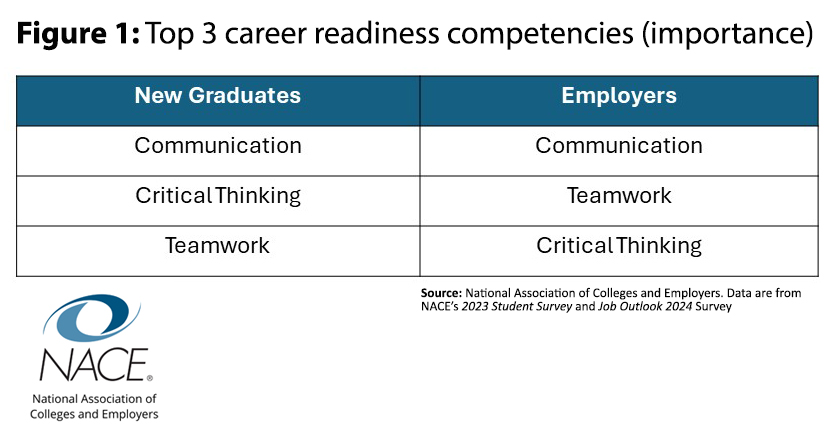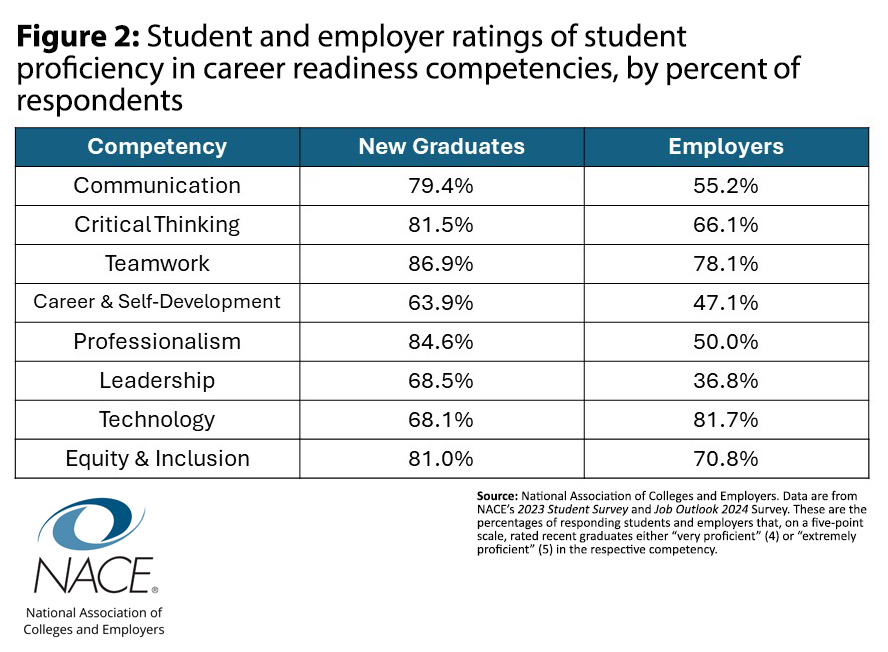CONTACT:
Kevin Gray, 610.625.1039; Andrea Koncz, 610.625.1021
DATE:
Feb 6, 2024
SUBJECT:
Recruiters, Students Have Differing Views of New Grads’ Career Readiness
BETHLEHEM, PA—Although new college graduates looking to enter the workforce and employers hiring these graduates agree on which competencies are most important for job candidates to hone, their perception of student proficiency in them differs widely, according to research conducted by the National Association of Colleges and Employers (NACE).
Graduating seniors taking part in NACE’s 2023 Student Survey ranked communication, critical thinking, and teamwork as the three most important competencies for a job candidate to develop to be considered career ready. Likewise, in NACE’s Job Outlook 2024 survey, employers positioned the same three career readiness competencies at the top of their list. (See Figure 1.)
However, the two groups disagree about what new graduates are best at and how proficient new grads actually are. (See Figure 2.)
“There is a clear disconnect between how students and employers perceive students’ development of these competencies. For all but one of the competencies, college students believe they are more proficient than do their potential employers,” says Shawn VanDerziel, NACE’s president and chief executive officer.
Asked to rate their level of proficiency in NACE’s eight career readiness competencies, new graduates consider themselves most proficient in teamwork, professionalism, and critical thinking. On the other hand, employers rated new graduates highest in technology, teamwork, and equity and inclusion.
Sometimes, the gap is quite large, as in the case of professionalism, where 84.6% of students and just 50% of employers perceive students to be “very or extremely” proficient in this competency.
“This general disconnect may occur because many students don’t understand the connection between the knowledge and experience they gained in college and the competencies. Therefore, students cannot effectively articulate this to employers on their resumes or during interviews,” VanDerziel says.
To address this, career centers have implemented initiatives and programming and NACE offers resources—such as sample behaviors—that help students understand how their classroom work, internships, and other experiences have helped them build and strengthen their career readiness competencies.


About Job Outlook 2024: Data for the Job Outlook 2024 survey were collected from August 2, 2023, through September 18, 2023. Of the 255 total respondents, 180 were NACE employer members, representing 20.3% of eligible member respondents. The Job Outlook 2024 survey was also distributed to nonmember companies, from which an additional 75 responses were received.
About the 2023 Student Survey: NACE’s 2023 Student Survey was conducted from March 15, 2023, to May 19, 2023. Overall, 18,966 bachelor’s degree-level students took part.
About the National Association of Colleges and Employers: Established in 1956, the National Association of Colleges and Employers (NACE) is the only professional association in the United States that connects 12,300 college career services professionals, more than 4,000 early career talent acquisition professionals, and more than 400 business solution providers that serve this community.
NACE is the premier source of market research on career readiness, the employment of recent college graduates, and the college-to-career transition. NACE forecasts hiring and trends in the job market; tracks salaries, recruiting and hiring practices, and student attitudes and outcomes; and identifies best practices and benchmarks.
NACE offers its members unparalleled research, networking and professional development opportunities, guidance on standards and ethics, and advocacy on key issues. For more information, visit www.naceweb.org. NACE maintains a virtual press room for the media.